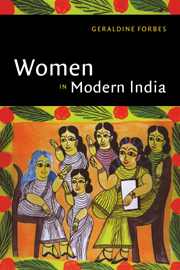Book contents
- Frontmatter
- Introduction
- 1 Reform in the nineteenth century: efforts to modernize women's roles
- 2 Education for women
- 3 The emergence of women's organizations
- 4 The movement for women's rights
- 5 Women in the nationalist movement
- 6 Women's work in colonial India
- 7 A time of transition
- 8 Women in independent India
- Bibliographic essay
- Index
- THE NEW CAMBRIDGE HISTORY OF INDIA
- References
2 - Education for women
Published online by Cambridge University Press: 28 March 2008
- Frontmatter
- Introduction
- 1 Reform in the nineteenth century: efforts to modernize women's roles
- 2 Education for women
- 3 The emergence of women's organizations
- 4 The movement for women's rights
- 5 Women in the nationalist movement
- 6 Women's work in colonial India
- 7 A time of transition
- 8 Women in independent India
- Bibliographic essay
- Index
- THE NEW CAMBRIDGE HISTORY OF INDIA
- References
Summary
Among the earliest women's memoirs from the nineteenth century are stories of a passionate desire to learn to read. Rassundari Devi, born c. 1809, taught herself to read by stealing precious moments from her housework and the responsibilities of caring for twelve children. Later, she described her craving for knowledge:
I was so immersed in the sea of housework that I was not conscious of what I was going through day and night. After some time the desire to learn how to read properly grew very strong in me. I was angry with myself for wanting to read books. Girls did not read … That was one of the bad aspects of the old system. The other aspects were not so bad. People used to despise women of learning … In fact, older women used to show a great deal of displeasure if they saw a piece of paper in the hands of a woman. But somehow I could not accept this.
Rashsundari's progress was slow but she learned to read, to write, and finally wrote about her own experiences.
Haimabati Sen (c. 1866–1932), born a half-century later, recalled her childhood in khulna District of East Bengal:
The outer quarters were my resort, that is where I spent all my time; during the office hours I stayed in the school room. The teacher was very fond of me. I greatly enjoyed listening to the lessons. But I had no right to education. Though I lived like a boy in every respect, in matters of education I remained a woman. It is a popular superstition in our country that women, if educated, have to suffer widowhood; hence that path was entirely closed for me. But I was inspired by an eager wish God had planted in my heart.
- Type
- Chapter
- Information
- Women in Modern India , pp. 32 - 63Publisher: Cambridge University PressPrint publication year: 1996
References
- 1
- Cited by

